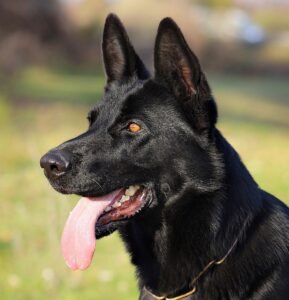German shepherds History and Origin

- Developed in Germany in the late 19th century by Captain Max von Stephanitz.
- Gained popularity worldwide for intelligence, strength, and versatility.
Physical Characteristics
- Large, well-muscled dogs with distinctive appearance.
- Various coat colors including black and tan, sable, and solid black.
Temperament
- Confident, courageous, and steady.
- Alert and watchful, making them excellent guard dogs.
- Gentle and affectionate with their families.
Lifespan and Health
- Average lifespan of 9 to 13 years.
- Prone to health issues like hip and elbow dysplasia, degenerative myelopathy, and bloat.
- Regular veterinary care, healthy diet, and exercise crucial for management.
German Shepherd Description, Breed, and Treatments

Breed Standards
- Noble and proportionate appearance.
- Males: 24 to 26 inches tall; Females: 22 to 24 inches.
- Weight: 50 to 90 pounds.
Coat and Grooming
- Double coat requiring regular brushing.
- Shed year-round, heavy during shedding seasons.
- Bathing as needed.
Exercise and Training
- Require daily exercise and mental stimulation.
- Excel in obedience training and dog sports.
- Regular walks, playtime, and training sessions essential.
Common Health Issues and Treatments
- Hip and Elbow Dysplasia
- Degenerative Myelopathy
- Bloat (Gastric Dilatation-Volvulus)
German Shepherd Characteristics Table and Living Standard
| Characteristic | Description |
| Size | Large |
| Weight | 50-90 pounds |
| Height | 22-26 inches |
| Coat | Double coat, medium to long length |
| Lifespan | 9-13 years |
| Temperament | Loyal, protective, intelligent, and versatile |
| Exercise Needs | High |
| Grooming Needs | Moderate (regular brushing) |
| Trainability | Very high (intelligent and eager to please) |
| Health Issues | Hip dysplasia, elbow dysplasia, degenerative myelopathy, bloat |
Characteristics Table
- Size: Large
- Weight: 50-90 pounds
- Height: 22-26 inches
- Coat: Double coat, medium to long length
- Lifespan: 9-13 years
- Temperament: Loyal, protective, intelligent, and versatile
- Exercise Needs: High
- Grooming Needs: Moderate
- Trainability: Very high
- Health Issues: Hip dysplasia, elbow dysplasia, degenerative myelopathy, bloat
Living Standards
- Prefer homes with a yard but can adapt to apartment living with proper exercise.
- Need at least an hour of exercise daily.
- Early socialization and training crucial.
- Great family dogs for active households.
Exercise and Activity
- Daily walks, running, hiking, and playtime recommended.
- Participation in dog sports provides mental stimulation and physical activity.
Socialization and Training
- Early exposure to various environments, people, and animals vital.
- Obedience training should start early and continue throughout life.
Family Compatibility
- Good with children and other pets when properly socialized.
- Excel as watchdogs but need training to distinguish between friendly visitors and threats.
In Conclusion
- German Shepherds possess admirable traits like loyalty, intelligence, and versatility.
- Require dedicated care, training, and socialization.
- Make loyal, intelligent, and versatile companions for the right owners.
Nutrition:
- Discuss the importance of feeding a high-quality diet with balanced nutrition.
- Explore different feeding options such as commercial dog food, raw diet, or home-cooked meals.
- Provide guidance on portion control, feeding frequency, and monitoring your dog’s weight.
- Highlight specific dietary considerations for German Shepherds, such as their predisposition to certain health issues like bloat.
Veterinary Care:
- Emphasize the significance of regular veterinary check-ups and vaccinations in maintaining your German Shepherd’s health.
- Discuss preventive measures such as flea and tick control, heartworm prevention, and parasite management.
- Provide guidance on recognizing signs of illness or discomfort and when to seek veterinary attention.
- Outline the importance of spaying or neutering and dental care in ensuring your dog’s overall well-being.
Grooming:
- Offer detailed instructions on how to groom your German Shepherd, including brushing techniques for their double coat.
- Discuss the importance of regular grooming in preventing matting, controlling shedding, and promoting healthy skin and coat.
- Provide tips on nail trimming, ear cleaning, and dental hygiene to maintain your dog’s overall cleanliness and health.
Environment:
- Discuss the importance of providing a safe and stimulating environment for your German Shepherd both indoors and outdoors.
- Offer suggestions for creating a comfortable living space with appropriate bedding, toys, and enrichment activities.
- Highlight the importance of regular exercise and mental stimulation in preventing boredom and behavioral issues.
Legal Responsibilities:
- Outline the legal obligations associated with dog ownership, including licensing, registration, and adherence to local ordinances.
- Discuss liability issues and the importance of properly restraining your dog in public spaces.
- Provide guidance on responsible pet ownership, including proper waste disposal and respectful behavior towards neighbors and community members.
Emergency Preparedness:
- Offer guidance on creating an emergency preparedness plan for your German Shepherd, including evacuation procedures and assembling a pet emergency kit.
- Discuss the importance of microchipping and ensuring your dog wears a collar with updated identification tags.
- Provide information on pet first aid and CPR techniques for handling emergencies until veterinary care can be obtained.
Is a German shepherd a Good Pet?
- German Shepherds are popular worldwide due to their intelligence, loyalty, and versatility.
- Ideal for various roles such as police work, search and rescue, and service dogs.
- Known for their loyalty and protective nature, making them excellent guard dogs.
Intelligence and Trainability
- Highly intelligent and quick learners.
- Can be trained for various tasks, including basic obedience and advanced skills.
- Ideal for roles in police work, search and rescue, and as service dogs.
Loyalty and Protection
- Form strong bonds with their families.
- Highly protective instincts, requiring proper training and socialization.
- Excel as guard dogs with the right training.
Active and Energetic
- Thrive in environments with plenty of exercise opportunities.
- Suitable for active families or individuals who enjoy outdoor activities.
Socialization Needs
- Good with children and other pets, but early socialization is crucial.
- Exposure to different environments, people, and animals at a young age is essential.
Considerations
- Require commitment to regular exercise, training, and mental stimulation.
- Not suitable for sedentary lifestyles or prolonged periods away from home.
- Proper socialization needed to prevent aggressive behavior.
What is the Best Breed of German Shepherd?
- Working Line German Shepherds
- Show Line German Shepherds
- American vs. European Lines
What is Special About German Shepherds?
- Intelligence and Versatility
- Strong Work Ethic
- Loyal and Protective Nature
- Physical Abilities
- Adaptability




